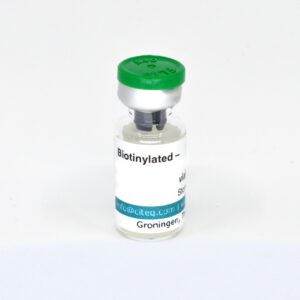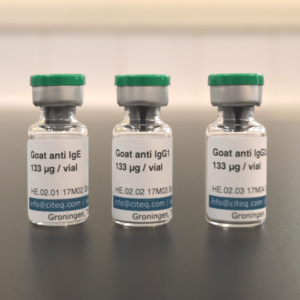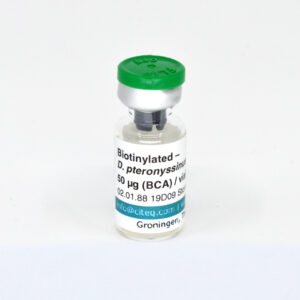Biotinylated material
Citeq specializes in the production of allergenic extracts. We offer a broad assortment of extracts from house dust and storage mites, insects, molds, food, and plants. In addition to our regular products, we now supply biotinylated extracts for research and diagnostic purposes. We can biotinylate all our extracts upon your request. This process will take 3-4 weeks from placing the order until shipment. Please contact us at info@citeq.com for current prices and availability.
Biotinylated products have a wide range of applications in the field of respiratory allergy, as many techniques are compatible with them. Due to the high specificity and strength of the biotin-avidin interaction, biotinylation can be used to detect and/or purify proteins. Biotinylated products could be included in various settings of experiments with animal models as the analysis tool to confirm the proper immunization of the subjects or to verify their response to treatment. Additionally, they could help quantify the complex responses from the immune system to make research and diagnosis as precise as possible.
During biotinylation, biotin is attached to macromolecules or proteins. The choice of the functional group to add to biotin is quite large, as a variety of molecules could be attached to it. Besides, it could be used in a different experimental setting with various mediums as the biotin-avidin interaction is not affected by the changes in pH, temperature and other factors. The biotinylated products could also be utilized with standard methods, such as western blot analysis, fluorescence-activated cell sorting (FACS)/ flow cytometry and enzyme-linked immunosorbent assay (ELISA).
On this page you can read more about biotinylation and the protocol for our biotinylated proteins.
Biotinylated material
Other categories
Showing all 10 results
-
 Biotinylated material
Biotinylated materialBiotinylated Der f 1
 Biotinylated material
Biotinylated materialBiotinylated Der p 1
 Antibodies
AntibodiesDetermination of successful sensitization of mice using biotinylated D. pteronyssinus
 Biotinylated material
Biotinylated materialBiotinylated D. farinae extract
 Biotinylated material
Biotinylated materialBiotinylated D. pteronyssinus extract
 Biotinylated material
Biotinylated materialBiotinylated Lepidoglyphus destructor extract
 Biotinylated material
Biotinylated materialBiotinylated Acarus Siro extract
 Biotinylated material
Biotinylated materialBiotinylated Tyrophagus putrescentiae extract
 Biotinylated material
Biotinylated materialBiotinylated Glycyphagus domesticus extract
 Biotinylated material
Biotinylated materialBiotinylated Blomia tropicalis extract
Citeq specializes in the production of allergenic extracts. We offer a broad assortment of extracts from house dust and storage mites, insects, molds, food, and plants. In addition to our regular products, we now supply biotinylated extracts for research and diagnostic purposes. We can biotinylate all our extracts upon your request. This process will take 3-4 weeks from placing the order until shipment. Please contact us at info@citeq.com for current prices and availability.
Biotinylated products have a wide range of applications in the field of respiratory allergy, as many techniques are compatible with them. Due to the high specificity and strength of the biotin-avidin interaction, biotinylation can be used to detect and/or purify proteins. Biotinylated products could be included in various settings of experiments with animal models as the analysis tool to confirm the proper immunization of the subjects or to verify their response to treatment. Additionally, they could help quantify the complex responses from the immune system to make research and diagnosis as precise as possible.
During biotinylation, biotin is attached to macromolecules or proteins. The choice of the functional group to add to biotin is quite large, as a variety of molecules could be attached to it. Besides, it could be used in a different experimental setting with various mediums as the biotin-avidin interaction is not affected by the changes in pH, temperature and other factors. The biotinylated products could also be utilized with standard methods, such as western blot analysis, fluorescence-activated cell sorting (FACS)/ flow cytometry and enzyme-linked immunosorbent assay (ELISA).
On this page you can read more about biotinylation and the protocol for our biotinylated proteins.
